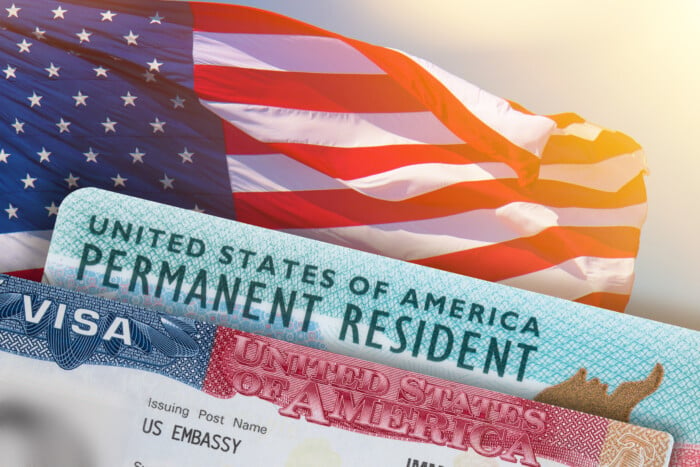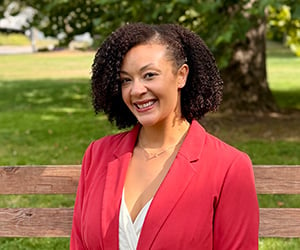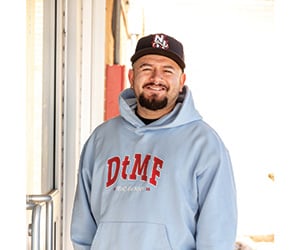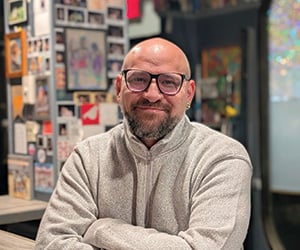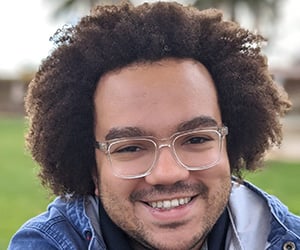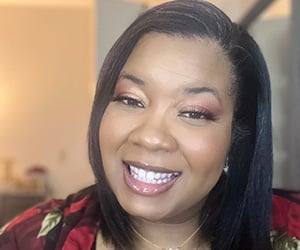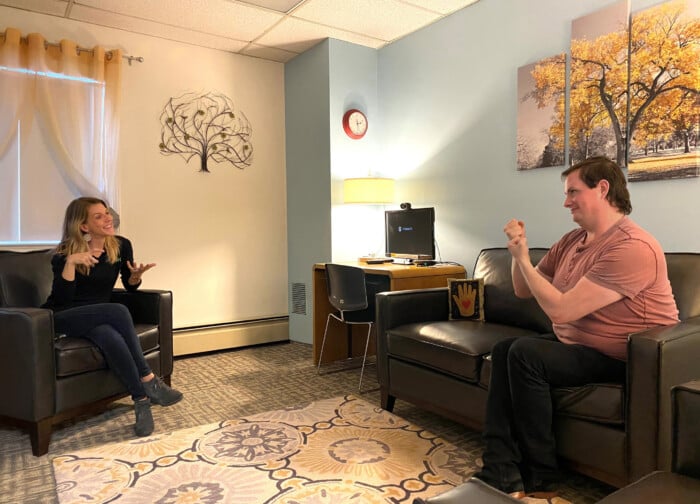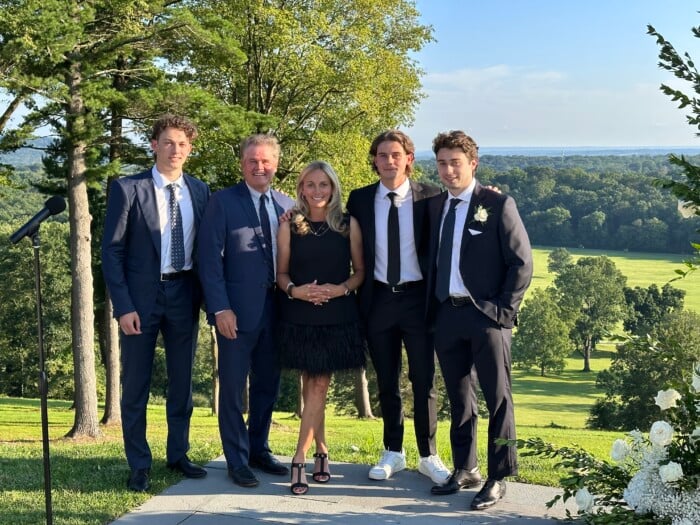A Journey of Belonging
New Americans overcome legal forms, language barriers and personal sacrifices for the obligation to engage in civic life.

Citizens raising their hands to their chest as they say the pledge of allegiance for the first time.
On a cool and crisp June morning in Concord, the skies outside were gray and overcast. But inside the federal U.S. District Courthouse, the mood was joyous and warm. More than 70 Granite Staters from across the world, different languages, cultures and walks of life gathered to complete a journey that was years in the making.
In unison, they stood, raised their right hands, and took the Oath of Allegiance in front of their family and friends.
And in that moment, they became American citizens.
The ceremony was fittingly held on Flag Day, and U.S. First Circuit Judge Seth Aframe warmly addressed the courtroom with solemnity and clarity.
“We’re not just celebrating the country,” he said. “We’re celebrating you.” Drawing on history, civic philosophy and his own family’s immigration story, Aframe reminded those assembled that American identity isn’t forged by bloodline or birthplace, but by commitment.
“This country is never in decline,” he said, “because of people like you with new hopes, new ideas and new dreams.” He also reminded the new citizens of what the oath symbolized. Not just loyalty to a new country, but full participation in a shared democratic life.
“It is now your obligation to work to preserve this Constitution, which guarantees equal protection of the law and due process of the law, and empowers us all with the freedom of speech,” Aframe said. “It is your duty to use that power to speak freely, to call out injustice when you see it, to work for positive change, to convince your fellow citizens of the path to justice, to run for office if you can, and, of course and always, to vote.”
Naturalization ceremonies like this one occur monthly across the state, at the U.S. Courthouse, U.S. Citizenship and Immigration Services (USCIS) field offices in Bedford, and occasionally at Strawbery Banke in Portsmouth, one of New Hampshire’s oldest neighborhoods, which eventually grew into a multicultural neighborhood of newcomers.
While each event is a celebration, behind every raised hand is a story of paperwork, perseverance, language barriers, long waits, and, for many, the tireless support of local nonprofits.
“We meet them where they are,” said Vijay Bhujel, deputy director of Building Community in New Hampshire (BCNH), a Manchester-based nonprofit that provides ESOL classes, citizenship preparation, and one-on-one case management. “Some of the people we work with have never been to school. They don’t read or write English. And the system doesn’t make it easy.”
Bhujel described one case involving an elderly woman from Haiti who couldn’t read or speak English. “There’s a medical waiver called a Form N-648 for people with conditions like dementia who can’t complete the civics test. But even that is treated with suspicion. A USCIS officer asked her if she had paid off her doctor. It was humiliating.”
Legal hurdles, changing immigration policies and bureaucratic delays add to the stress. That’s where organizations like BCNH and the International Institute of New England (IINE) step in. With offices in Manchester, Lowell and Boston, IINE provides resettlement services, legal support, and job placement for immigrants and refugees.
“We are always educating our clients about their rights,” said Jeff Thielman, president and CEO of IINE.
“We tell people: If you’re a refugee, you have legal status. You have a pathway to citizenship. But delays, costs and fear, especially around deportation, are real concerns.”
Thielman points to recent changes requiring in-person interviews for green card applicants. It was a step that was previously waived due to extensive background checks before refugees arrived in the U.S. “It’s slowing down the process and adding unnecessary stress,” he said.
Despite the obstacles, Thielman says, the reward is undeniable. “I’ve been to naturalization ceremonies, and it’s one of the most moving parts of this work. When a former client becomes a citizen, you know they’ve made it. They’re protected. They belong,”

Tito Leonardo Soria, left, from Guayaquil, Equador, stands with Judge Seth Aframe and his sponsor and friend, Edison Arrana of Nashua.
That sense of belonging was palpable for Margarita Cáceres, a Manchester resident who became a U.S. citizen at the June ceremony. Originally from El Salvador, she moved to New Hampshire in 2011 in search of a better life.
“Everything is very hard right now with immigration,” she said. “As soon as I had my years in (as a permanent resident), I said, I want to be a citizen.”
Cáceres said she studied diligently, passing her civics and English tests on the first try despite her nerves. “The officer said, ‘Can you please relax?’ But I couldn’t. I cared too much,” she said, laughing.
Her husband, Juan, and their 6-year-old daughter, Allison, a U.S. citizen by birth, were there to witness her milestone. Her next dream? Homeownership. “I want to own my own house. That’s what I’m working toward now,” she said.
As Judge Aframe reminded the room, it’s not just about arriving. It’s about engaging, knowing your neighbors, joining a PTA, starting a book club, or running for office. It’s about living the American story while never forgetting your own.
“You are a hero,” he told the new citizens. “Your children, and your children’s children, will one day look back and thank you for your courage.”
Voices from New Americans

Nashua system engineer William Louisdor,
from Haiti, proudly displays his American flag and citizen certificate.
William Louisdor, 28, Nashua
For William Louisdor, the journey to citizenship was long and at times frustrating. The 28-year-old systems engineer immigrated from the Delmas neighborhood of Port-au-Prince, Haiti, as a child and had spent most of his life in the U.S. before deciding to formalize it all in 2025.
“I mean, I’ve been here most of my life…basically a citizen,” he said. “But I had no official paperwork. I wanted to get it done so that if anything were to happen, I wouldn’t get deported to my country.”
William filed for naturalization in 2022 and attempted to navigate the process alone. That decision led to delays and reviews, including some court-related issues. “It was difficult because I did it on my own,” he said. “I missed a couple of things, and that prolonged the process.”
Three years later, standing inside the Concord federal courthouse, he finally reached the finish line. “It feels amazing. Like a new man,” he said with a smile. First on his to-do list? “Update my license, my Social Security card, and my passport.”
His advice for others? Don’t go it alone. “Definitely consult a lawyer and work with someone. The process is difficult,” he said.
Anjeli Santos, 24, Nashua
(with Zunilda Tavares and Mari Anjel Santos)
When Anjeli Santos raised her hand to take the Oath of Allegiance, her voice trembled with emotion. Her mother, Zunilda Tavares, stood beside her, hand raised, eyes glistening, while her younger sister, Mari Anjel, just 17, watched quietly from the gallery. Though Mari became a citizen too, her age meant she didn’t take part in the formal ceremony.
Still, for this family, the moment marked the end of a long journey and the beginning of a new chapter. Anjeli, now 24 and living in Nashua, did most of the talking on Concord’s Main Street that day.
As the family translator, she not only interpreted words but also bore the weight of their shared story. The family moved to New Hampshire from the Dominican Republic five years ago, seeking better economic opportunities and stability. Zunilda had married an American, which allowed her and her daughters to emigrate legally. But the road wasn’t easy.
“I didn’t understand the sacrifice at first,” she said. “I was 18, I’d just graduated high school, and all I wanted was to stay with my friends and enjoy my life back home.” But the promise of something more, a life where dreams like owning a car, going to college or becoming a homeowner felt possible, gradually took root.
Learning English was one of the first hurdles. Anjeli remembers stumbling at first, struggling to understand even basic conversations. “Now, I speak fluently,” she said proudly. “I have a good job. I’ve built something here that would’ve taken me so much longer back in the Dominican Republic if it was even possible at all.”
Still, that transition wasn’t without fear. “I was really anxious when we started the citizenship process,” Santos said. “Especially for my mom, because she doesn’t speak English. I worried … what if she got pulled aside during the interview? What if they didn’t believe her? Even though we were here legally, the fear was real.”
That anxiety speaks to a deeper truth for many immigrants in America: That legality doesn’t shield you from vulnerability. “Even now, as citizens, we still look Latino. That doesn’t change how people might treat us. But I’ve been lucky. At work, I’ve always been welcomed by white colleagues, by Latinos, by everyone. That’s made a difference,” she said.
The family found community in unexpected places. An early job at Forever 21 connected Anjeli with a Cuban co-worker who helped her feel at home. Since then, she’s seen New Hampshire grow more diverse than it once was.
“We were worried we wouldn’t see people who looked like us,” she said. “But that’s changing. There’s a big Dominican community now.”
Becoming a citizen, Anjeli said, isn’t just about papers. “It’s about having a voice. It means you can vote. It means you have the right to speak up about the laws that affect your life. People who live here without citizenship are still part of this community. They go to school, they pay taxes, they raise families, but they don’t have that same power.”
She spoke candidly about the challenges others face in trying to “do it the right way,” a phrase often used by critics of undocumented immigrants.
“There is no ‘right way,’” Santos said plainly. “This is stolen land. People who were born here were just lucky. They don’t always understand the sacrifice it takes to come here.”
She knows people who are undocumented, college-educated, tax-paying, law-abiding, and yet unable to live freely. “It breaks my heart,” she said. “Because they’re doing everything a citizen does, but without the rights or recognition.”
What’s next for the Santos-Tavares family? They’re registering to vote. They’re updating their licenses, Social Security records and applying for passports. And they’re holding onto the gratitude that anchors their American story, one built not just on paperwork and policy, but on persistence, courage and love.
“It’s a privilege to be here,” Santos said. “And now, we get to help tell the story of what being American really means.”
For many, this journey is years in the making. But with the help of local nonprofits, dedicated volunteers and personal grit, the path, while complex, remains one worth walking.
The Naturalization Process:
A Step-by-Step Overview (Source: USCIS)
Determine Eligibility
Applicants must typically be lawful permanent residents (green card holders) for at least five years (or three if married to a U.S. citizen), be 18 or older, and demonstrate good moral character, continuous residence, and the ability to speak, read, and write basic English.
Prepare Form N-400
The Application for Naturalization (Form N-400) can be completed online or on paper. As of 2025, the filing fee is $640, plus an $85 biometric services fee (fee waivers are available for eligible applicants).
Attend Biometrics Appointment
Applicants are scheduled for a fingerprinting appointment to conduct background checks.
Complete the Naturalization Interview and Tests
At the interview, applicants must answer questions about their application and take English and civics tests. Exceptions exist for older applicants and those with medical conditions.
Receive a Decision
USCIS will approve, continue (ask for more information), or deny the application. If approved, the applicant proceeds to the final step.
Take the Oath of Allegiance
Applicants are scheduled for a naturalization ceremony, where they take the Oath of Allegiance and receive a Certificate of Naturalization, officially becoming U.S. citizens.
This article was featured in 603 Diversity.
603 Diversity’s mission is to educate readers of all backgrounds about the exciting accomplishments and cultural contributions of the state’s diverse communities, as well as the challenges faced and support needed by those communities to continue to grow and thrive in the Granite State.

